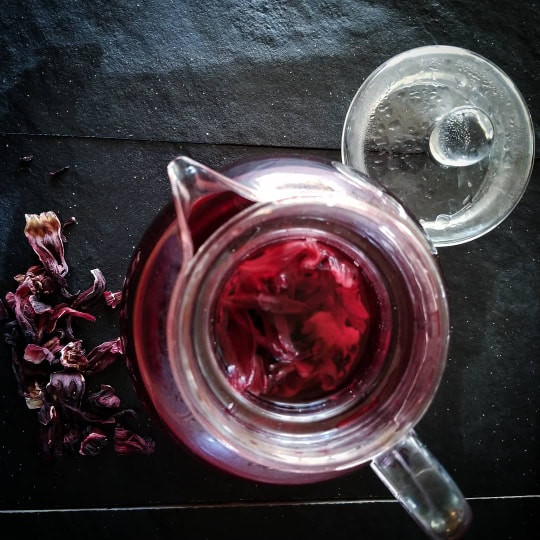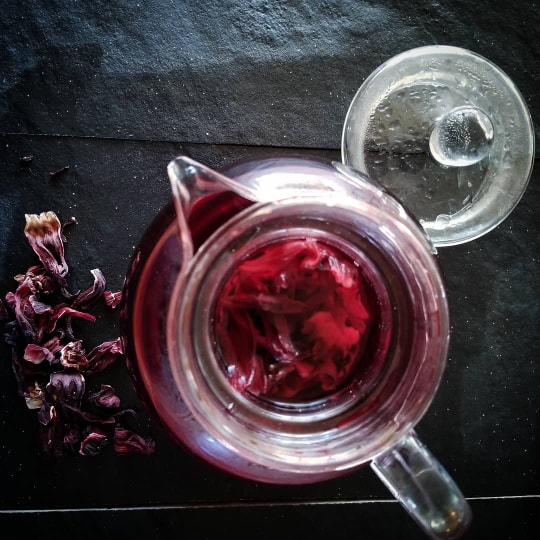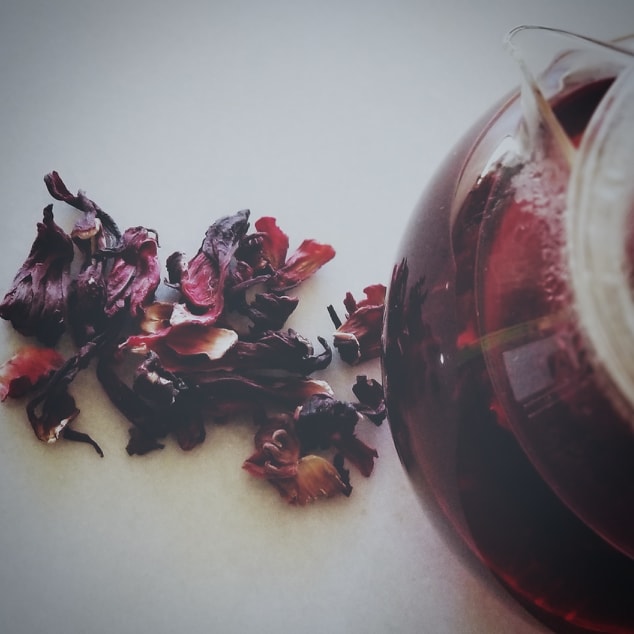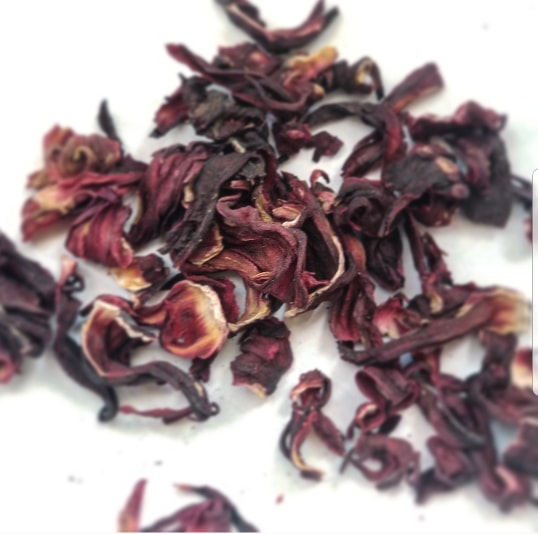
Top 11 Surprising Benefits of Hibiscus Tea
Hibiscus tea – Holy Health Benefits!
Do you have any idea how many crazy health benefits there are in this sweet little flower? More sour, than sweet, hibiscus has a flavor similar to cranberries. If you want a delicious, healthy, caffeine-free cup of tea – reach for hibiscus! Now, let's break it down....

TOP 11 BENEFITS OF HIBISCUS TEA
1. Calms nervous disorders
Hibiscus tea has been used for thousands of years in various cultures around the world. It is also gaining a lot of attention in modern science remedies too. Many claim that it can be used to calm nervous disorders and help with sleep. In a study preformed in 2003 on mice, they concluded that hibiscus extract may contain components that belong to the class of neuroleptics or antidepressants and also prolonged the duration of sleep.
2. Speeds up metabolism.
Hibiscus tea may also help to shed a few pounds. One study found that hibiscus was effective at reducing obesity, abdominal fat, and serum-free fatty acids and improved liver steatosis. This study was done over a 12 week period and all subjects had a body mass index (BMI) equal to or greater than 27, which is considered to be overweight. The study found that the group that took the hibiscus extract pill lost weight, decreased BMI, decreased body fat, and altered their waist-to-hip ratio. They also showed improvement in liver function.
3. Decreases Blood Pressures, Lowers Cholesterol and Prevents Cardiovascular Disease.
The Journal of Nutrition published a recent study that used a randomized controlled trial to assess whether drinking hibiscus tea could reduce blood pressure in mildly hypertensive or pre-hypertensive adults. In this blind study of 100 participants. The group that was instructed to drink 3 servings of hibiscus tea a day found that just after just six weeks, there was a substantial reduction in systolic blood pressure in the patient group that was drinking the hibiscus tea. The blood-pressure-lowering effects of hibiscus tea could be a result of its flavonoid or its phytochemical content, although that's not entirely conclusive. The results of this study suggest that if consumed over time, hibiscus tea can reduce the risk of stroke and heart attack!
Hibiscus tea has also been shown to work as a natural diuretic. It increases both urination and bowel movements. As the water leaves the body, it takes sodium with it, which is one mechanism by which blood pressure is reduced.
Hibiscus tea contains a rich amount of anthocyanin, that's what gives the tea that lovely deep red color, which is a phenolic compound. It is believed that this active compound is responsible for the tea’s cardio-protective effects. Another study on hibiscus tea investigated the hypolipidemic effects of drinking hibiscus tea. This study specifically looked at patients suffering from metabolic disorders like diabetes. This study asked the patients to consume 2 servings a day over a months time. The group that drank the hibiscus tea saw an increase in high-density lipoprotein cholesterol (HDL, also known as the good cholesterol). The results also showed a significant decrease in the average total cholesterol and low-density lipoprotein-cholesterol (LDL, also known as the bad cholesterol). There you have it!
4. Strengthens Immunity
Hibiscus tea is has an extremely high ascorbic acid or vitamin C content. Vitamin C is well known for keeping the immune system in check by lending a hand in the production of white blood cells. White blood cells are warriors! It is their job to fight the pathogens and infections that creep in our bodies. The high amount of iron in hibiscus really contributes and aids in vitamin c absorption.
5. Good Source of Iron
For those suffering from anemia, hibiscus tea for the win! An 8-fluid-ounce serving delivers a suprising 20 milligrams of iron—an important mineral that keeps the immune system balanced and helps the body to maintain red blood cells (the carriers of oxygen around the body). The vitamin C naturally found within the hibiscus works to complement the iron, increasing its absorption. With the heaping amount of iron also comes small amounts of minerals like potassium, magnesium, and zinc. Who knew!?

6. Antimicrobial
A little tea goes a long way! Hibiscus can be used to fight against food-borne illnesses. One study conducted in 2011 investigated the antimicrobial activity of Hibiscus sabdariffa on Escherichia coli (better known as E. coli). The findings indicate that hibiscus was effective at all levels in inhibiting E. coli—therefore making it a promising antimicrobial agent that could be considered for inhibiting other types of food-borne illness.
7. Antifungal
A study conducted in 2014 found that hibiscus extract not only slows, stops, but INHIBITS the formation of Candida, a yeast that is getting a lot of negative attention for wrecking havoc on our gut which cause health issues, like psoriasis. When there is an overgrowth of Candida, because most of us have a little, there are limited medical options available. So when a powerhouse like hibiscus comes to the table, a natural plant-derived option, this may be one of the best options.
8. Reduces the Risk of Cancer
One of the most impressive studies we've researched on PubMed has shown that hibiscus extract, that was used to treat human tumor cell lines, specifically Multiple Myeloma and Oral Squamous Cell Carcinoma, impaired cell growth, exerted a reversible cytostatic effect, and reduced cell motility and invasiveness. Pretty impressive, huh?
A similar study has also encouraging results for treating breast cancer showing that hibiscus tea could be developed as a chemopreventive agent in the future.
9. High in Antioxidants
This list is getting impressive, but wait until you hear this! Hibiscus has TWICE the amount of antioxidants than Matcha! Sorry matcha, your #1 in antioxidant title has been given away to hibiscus! A tea, like hibiscus that is high in antioxidants can be helpful in reducing oxidative stress. While its high in ORAC (oxygen radical absorbance capacity), Hibiscus tea contains two antioxidants: anthocyanins and quercetin glucoside. Oxidative stress occurs when free radicals invade the body and the body does not have enough antioxidants to combat them. Free radical damage may contribute to all sorts of health issues ranging from cancer to aging skin, so adding hibiscus tea to your herbal remedies list might be a good idea.
10. Kidney Stone Prevention
Kidney stones occur when there is a buildup of calcium oxalates in the urine. These stones are painful, and it is difficult for them to leave the body. This study evaluated hibiscus as a way to prevent calcium oxalate crystals from turning into stones in rats. The study found that the calyces of the hibiscus flower are anti-urolithiatic and can be consumed with no harmful effects, meaning drinking hibiscus tea may be effective at preventing kidney stones.
11. Wound Healing
A study that used hibiscus leaves infused in an alcohol solution was tested by gene expression and functional analyses on different types of human skin cells. Treatment with this solution increased the healing potential of these issues by stimulating collagen production by up to 60%, while also improving skin hydration and homeostasis. Hibiscus stimulated the expression of biomarkers relevant to skin regeneration and hydration thereby counteracting molecular pathways leading to skin damage and aging. This might be worth adding the the first-aid kit!

A word of caution
As exciting as all this information is, don't over do it. When consumed in large amounts, which is cited by the World Health Organization as 15 cups a day (based on someone who's about 150 pounds), can be dangerous for your liver. Additionally, pregnant
women should make sure to steer clear of hibiscus tea—it can put
them at risk for premature labor or menstruation. It can also cause
blood sugar to drop suddenly, and even cause nausea and ear-ringing.
If you start to experience any of these negative side effects, stop
drinking hibiscus tea immediately. It should also be noted that we are not doctors and you should consult your medical guru before adding this to your daily herbal remedy arsnal.
